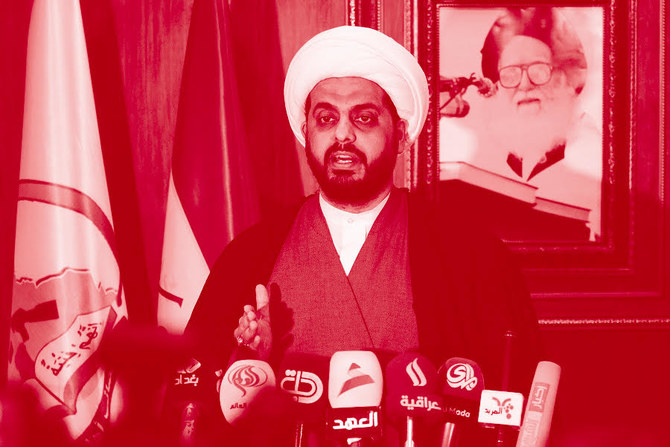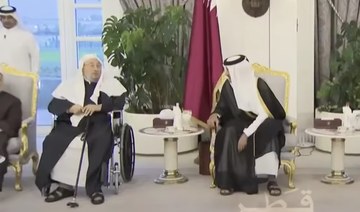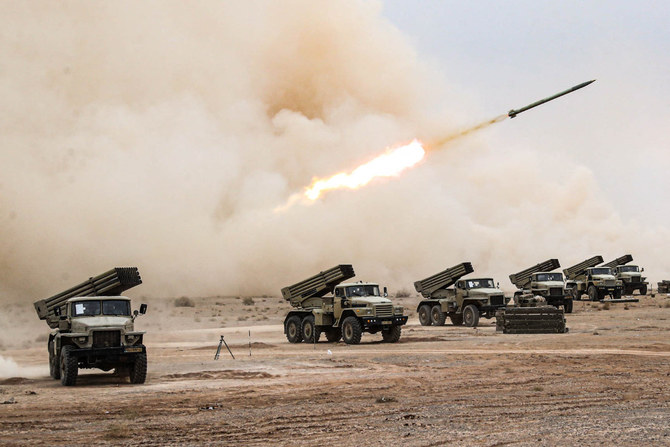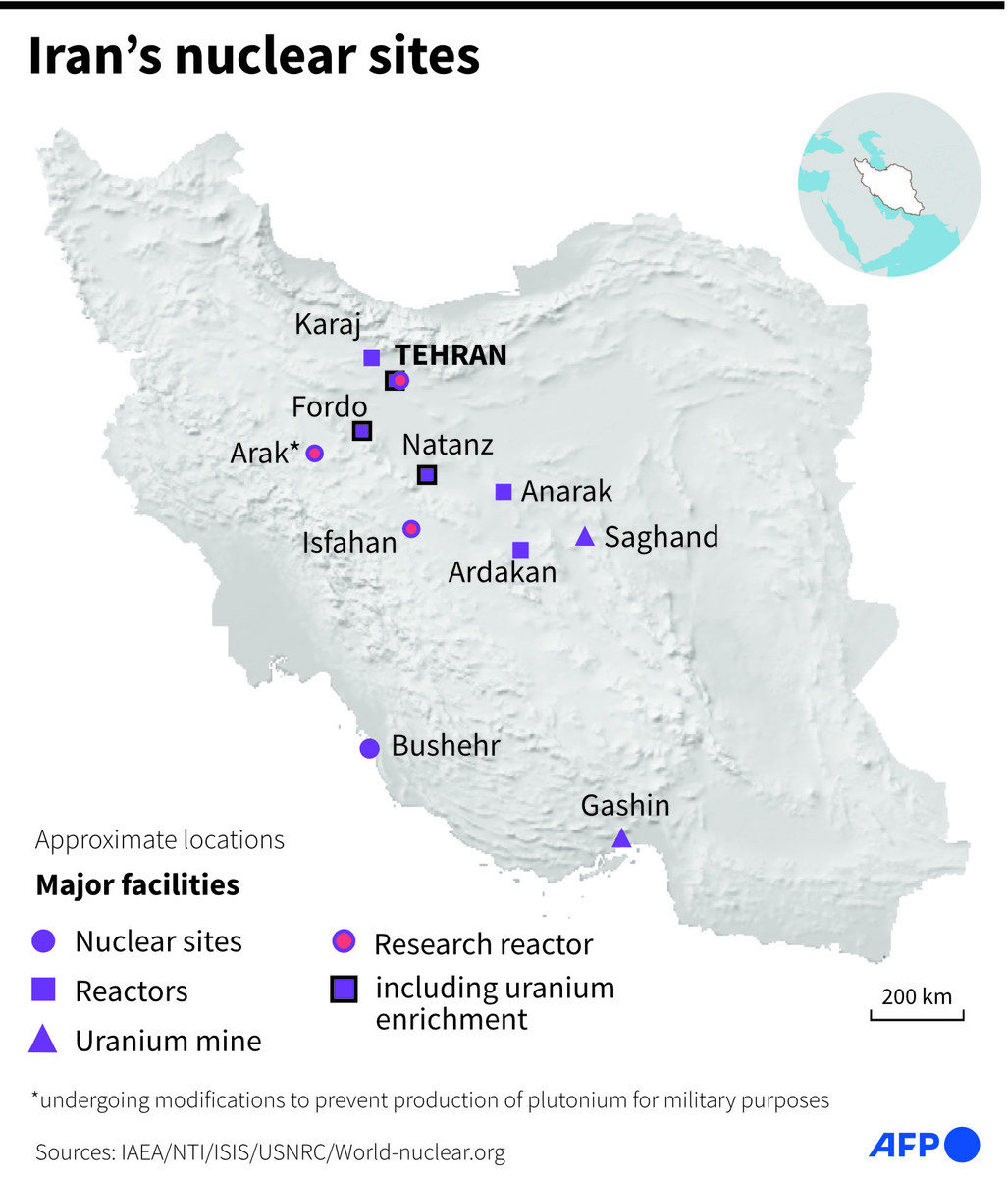DUBAI: Qais Al-Khazali poses in public as an Iraqi politician who understands and defends the national interest. When he is asked about his Iranian connections, he answers that he goes there only once a year as a tourist. His evasive responses are a cover for a violent sectarian agenda. Al-Khazali is one of the leading preachers of hate in Iraq and the wider region.
He derives his outsized influence from his status as the leader of Asa’ib Ahl Al-Haq (AAH), which includes a large number of fighters trained by members of Iran’s Islamic Revolutionary Guard (IRG) and the Lebanese Hezbollah. The number of AAH militants is estimated at about 10,000. He is also considered a loyal soldier of Iran’s Shiite theocracy.
“Listen carefully ... If you (Sunnis) do not stop your malicious projects, I swear you will not be safe ... will not be safe ... will not be safe,” he famously said in a televised speech in 2010.
On Aug. 22, 2014, the Sunni Musab bin Umair mosque in Diyala was targeted during Friday prayers by militiamen, who killed 73 people. The AAH militia was suspected of being behind the attack, despite it condemning the atrocity.
BIO
- Nationality : Iraqi
- Occupation: Secretary-General of Asa’ib Ahl Al-Haq (AAH) militia, member of Iraqi Parliament
- Legal status: Released by the US in 2007 prisoner swap deal with AAH
- Medium: Twitter, interviews and sermons
“The August 22 attack is consistent with a pattern of attacks that Human Rights Watch has documented, including kidnappings and summary executions, by Shia militias Asa’ib Ahl Al-Haq, the Badr Brigades and Kata’ib Hezbollah in Baghdad, Diyala and Babel provinces,” Human Rights Watch said after the attack in 2014.
Declassified US Central Command documents published by the Wall Street Journal last year indicated that Al-Khazali was part of the planning behind the Jan. 20, 2007 attack on the Provincial Joint Coordination Center in Karbala. He was arrested by US-British forces in March 2007 and interrogated by US authorities after the raid, which, according to Al-Khazali’s confession documents, was planned by Iran to kidnap five US soldiers, who were eventually killed.
ALSO READ:
Preacher of Hate: Qais Al-Khazali
Al-Khazali was handed to the Iraqi authorities in late 2009 after he pledged that his militia would give up their weapons. He was released in January 2010, reportedly in exchange for the release of Peter Moore, a computer consultant who had been kidnapped with four security guards in May 2007 by the AAH.
The Wall Street Journal reported details of the investigations into the Iranian role in supporting terrorist militias. Scrutiny of the relations between Muqtada Al-Sadr, the Iraqi Shiite cleric, politician and militia leader, and Tehran revealed a desire by Al-Sadr to control the flow of Iranian money to political groups in Iraq.
The investigations revealed Iranian efforts to train the militia that Al-Khazali was leading, and the relations between Tehran and Iraqi political figures, including the late Kurdish politician Jalal Talabani, then Iraq’s president.

These reports in August 2018 came at a time when the Trump administration was considering the inclusion of Al-Khazali and the AAH on the list of terrorist organizations to impose sanctions on. The group claims responsibility for 6,000 attacks on American soldiers and Iraqi government forces.
After completing his studies at the University of Baghdad in 1994, Al-Khazali was drawn to the ideas of the Grand Ayatollah Mohammed Sadeq Al-Sadr, who opposed the Baathist regime of Saddam Hussein and criticized it in his sermons at Friday prayers.
Al-Khazali traveled to Najaf to join one of Al-Sadr’s schools to study religious sciences. When Al-Sadr and two of his sons, Mustafa and Mu’ammil, were assassinated in 1999, his fourth son, Muqtada, entrusted Al-Khazali and one of his colleagues with supervising his father’s schools, offices and obtaining legitimate funds.
Al-Khazali won Muqtada’s confidence, and when the latter set up the Mahdi Army, the first Shiite militia formed to fight US troops in Iraq after the 2003 invasion that toppled Saddam, Al-Khazali was picked as one of its field commanders and to be Al-Sadr’s spokesman. A year later, Al-Sadr formed an elite force called “Special Groups” to carry out lethal attacks against American forces. Again he instructed Al-Khazali to command these groups alongside Akram Al-Kaabi, one of Al-Sadr’s father’s veteran students who heads the Al-Nujaba Brigades, a Shiite group that was sanctioned by the Trump administration last year. As a follower of Iran’s Wilayat Al-Faqih (Guardianship of the Islamic Jurist) political system, the AAH has participated in the Syrian civil war as Iran’s foreign legion alongside Al-Nujaba and other armed groups.
Opinion
This section contains relevant reference points, placed in (Opinion field)
Al-Khazali began to don the hat of a politician only after the liberation of Mosul from Daesh in 2017 by the Iraqi military and Shia paramilitary groups that constitute the Popular Mobilization Force (PMF). The PMF, which was given the status of an official Iraqi security body in 2015, draws fighters from an array of forces and ethnicities, but its leadership consists overwhelmingly of Shiite groups with close ties to Iran.
According to the journal War on the Rocks, “groups like Kata’ib Hezbollah (Hezbollah Brigades), the Badr Organization, AAH, Al-Nujaba Brigades, and the Khorasani Brigades have received substantial training, arms, and direction from Iran. Iran still provides support to these forces ... these leading PMF forces and figures make no secret of their love for Iran and hatred for the United States.”
Now operating from behind a mask of political respectability — the AAH won 15 seats in parliament in the May 2018 elections as Al-Sadiqoun bloc — Al-Khazali is seen by many in Iraq as being well placed to bolster AAH recruitment, training and expansion.
US officials believe Al-Khazali’s participation in the elections was to empower the militia, following the model used by Hassan Nasrallah and Hezbollah to establish Iran’s dominance in Lebanon. A senior US official has said that of its 15 seats, only two were won fairly and the rest gained by corruption; the AAH denies this. Al-Khazali has declared Al-Sadiqoun’s parliamentary presence a failure, yet locks horns with anyone who challenges the bloc’s religious sectarianism.

























